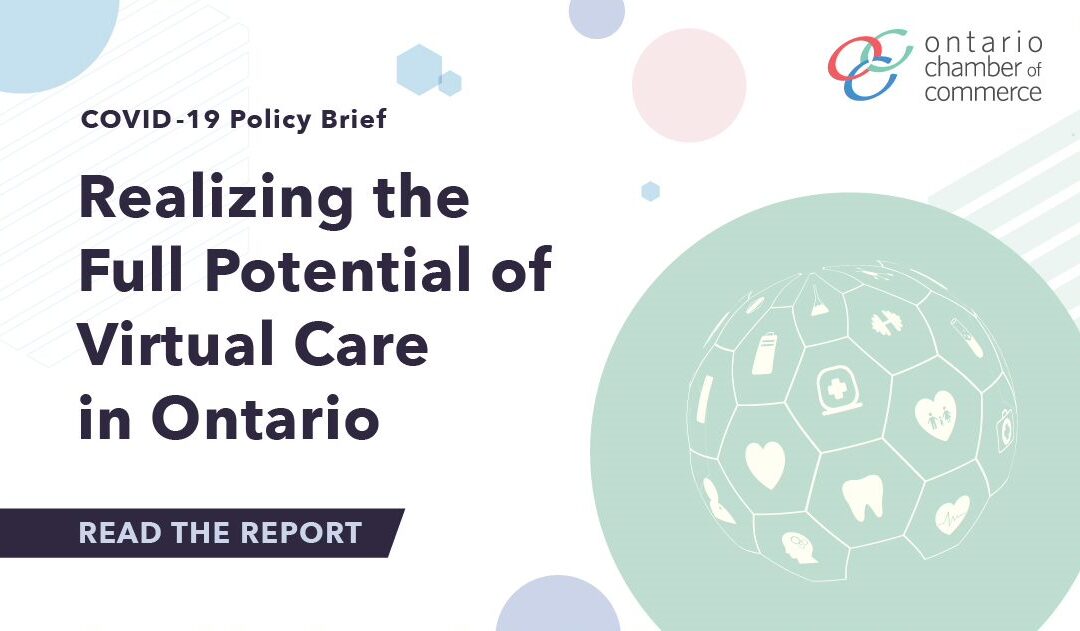FOR IMMEDIATE RELEASE
MEDIA RELEASE
DECEMBER 10
(BURLINGTON, December 10) – This week’s report from Ontario’s Auditor General has put the spotlight on virtual care. And while telemedicine sites have been in place for decades in Canada, the pandemic has accelerated the adoption of virtual care in Ontario. Virtual visits have enabled more and more Ontarians to continue accessing quality health care while not exposing themselves to the virus. The latest report by the Burlington Chamber of Commerce and Ontario Chamber of Commerce (OCC), Realizing the Full Potential of Virtual Care in Ontario, underscores the need to permanently integrate virtual care into Ontario’s health care system.
“We are now more virtually connected than ever before, and how Ontarians are interacting with the health care system reflects this fact,” said Rocco Rossi President and CEO of the OCC. “We can’t make the same mistakes we did with SARS, by only implementing temporary measures related to virtual care. The permanent integration of virtual care into our system could ensure all Ontarians can access timely and appropriate care, no matter their circumstances, as well as alleviate some of the pressures facing our health care system, such as reducing unnecessary visits to the ER.”
According to Canada Health Infoway’s September 2020 survey, 60% of health care visits with primary care physicians and specialists were conducted virtually at the onset of the pandemic.1 The report notes that given the uptick in virtual care usage, the resurgence of the pandemic in a second wave, and an uncertain timeline for a vaccine, a more permanent and comprehensive solution is needed.
“Long before COVID-19, Ontario’s health care system faced numerous pressures and growing costs. By empowering patients to manage their health while at home, virtual care has the potential to reduce the strain on primary care providers and hospitals, lessen the backlog in care, and protect frontline workers from exposure to the virus,” added Carla Y. Nell, President & CEO of the BCC. “We are calling on the Government of Ontario to consider urgent policy reforms such as modifying the existing fee code system to allow for the permanent and effective delivery of virtual care in Ontario.”
The report explains that, while the implementation of temporary billing codes in March 2020 allowed physicians to conduct virtual visits, these temporary codes were a stop-gap measure and have limitations.
The report provides the Government of Ontario with four recommendations to ensure virtual care is not only permanently integrated in our health care system, but is more equitable, accessible, and widely adopted:
- Develop a comprehensive framework for virtual care in Ontario.
- Modify the existing fee code system to allow for the permanent delivery of virtual care, and provide physicians with training and knowledge supports to allow care to be delivered virtually.
- Focus on equity to improve access to virtual care, including ensuring all Ontarians have internet access so that the expansion of virtual care options does not exacerbate inequities for patients in rural, remote, northern, and Indigenous communities.
- Support employers’ continued investment in virtual care for their employees that expand beyond care delivered virtually through the health system.
These recommendations were developed with the OCC’s Health Policy Council, a group of expert practitioners and industry representatives.
The report explains how virtual care is not solely about convenience for patients, but it also benefits the health care system as a whole. Further, virtual care should be viewed as one modality in which health care can be delivered, and should continue to complement, not replace in-person care.
“Looking beyond the pandemic, virtual care holds much promise and we believe our recommendations can help the Province realize the full potential of technology for patients and our health care system alike,” added Rossi.
The OCC would like to thank members of the Health Policy Council whose input helped shape this report.
READ THE REPORT.
[1] A survey conducted by Leger on behalf of Canada Health Infoway between April 3 to August 25, 2020, with 31,889 Canadians.
–30–
Media Contact
Lindsay Stevenson
Strategic Communications Coordinator
lindsay@burlingtonchamber.com


